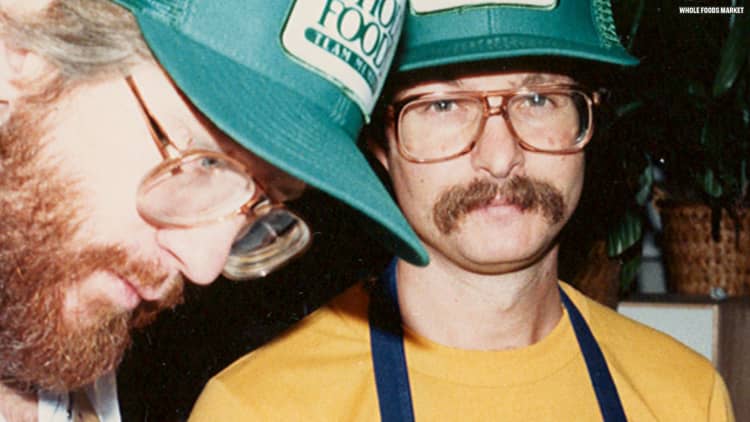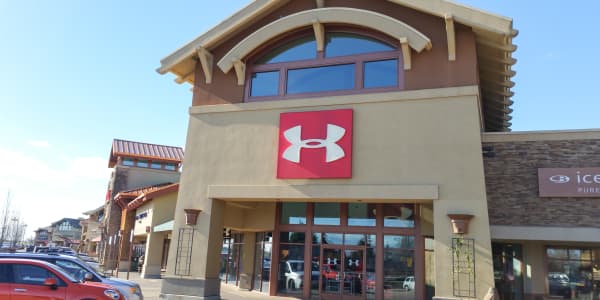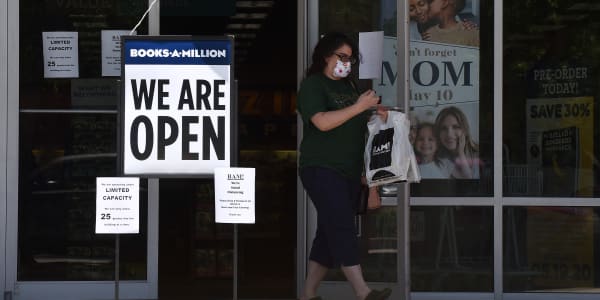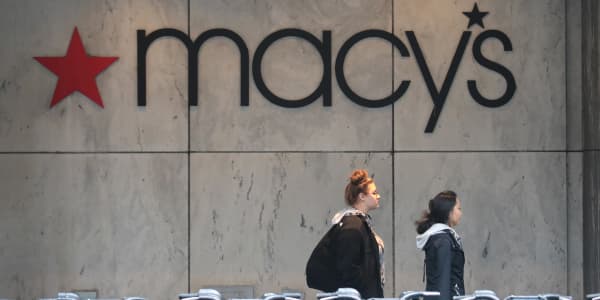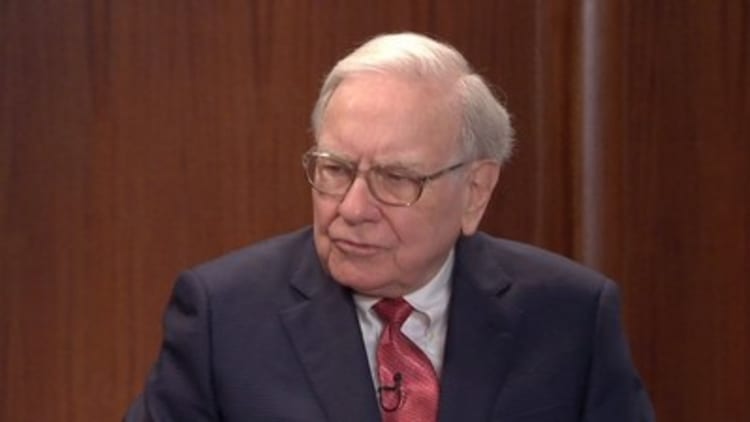
The grocery war Jeff Bezos and Amazon have started with the planned acquisition of Whole Foods has some obvious targets, including Wal-Mart, Costco and Target. One not-so-obvious quarry is also huge: Warren Buffett.
Buffett's Berkshire Hathaway is a big holder of supermarket and food company stocks.
Among Berkshire's relatively selective portfolio of publicly traded stocks are longtime holdings Wal-Mart and Costco, as well as Kraft Heinz (Buffett used to own tons of Kraft shares before engineering a deal to create Kraft Heinz), Coca-Cola and Mondelez, one of the world's largest snack companies.
Berkshire also owns McLane Co., a major food distributor it purchased in 2003 directly from Wal-Mart, the low-cost grocery company with which Amazon is now most seen as being on a "collision course."
Buffett's Kraft Heinz stake — 26 percent of the company's shares — is valued at $29 billion, and his Coke stake, representing 9 percent of its shares, is valued at $18 billion. Berkshire also has $100 million in Wal-Mart shares, which the company has reduced exposure to over time, and $700 million in Costco shares. It also has a very small $26 million holding in Mondelez.
Praise for 'remarkable' Bezos from Buffett
Buffett sang the praises of Bezos at Berkshire's annual meeting earlier this year, commenting that what the Amazon founder has done across multiple sectors is "remarkable." He called Bezos "the most remarkable business person of our age," and said he missed the boat on Amazon, using one word to explain his decision not to buy the stock: "stupidity."
Lawrence Cunningham, a law professor at George Washington University and author of the book "Berkshire Beyond Buffett," said the rise of Amazon puts one in mind of a variation on Buffett's "ovarian lottery" philosophy — that the world from 1975 to 2020 or so belonged to Buffett's skills, while the world of 1995 to 2045, say, may belong to Bezos'.
"That's how I took Warren's comments at the annual meeting," Cunningham said. "Jeff can see and steer how tech reshapes industries in ways Warren probably cannot. Warren long avoided tech; Jeff makes tech unavoidable."
There's another Bezos acquisition that gets overlooked as being in a Buffett sweet spot: The Washington Post. Bezos bought the newspaper three years ago from the Graham family, to whom Buffett was a longtime confidante.
Buffett, who owns several newspapers, was on the Post's board for a long time. In addition, Berkshire was a large shareholder, and Buffett did briefly consider buying the newspaper when it was for sale but decided against it, citing, among other reasons, not wanting to saddle a new CEO with a metro paper.
Jeff seems to relish cutthroat competition, and that itself seems to be a big driver of the moats he builds. ... Warren would have hated that world; Jeff thrives in it.Lawrence Cunninghamprofessor of law at George Washington University
"Not only does Warren love groceries and newspapers, the economics of both have been changing in ways that no one could have imagined when Warren fell in love with them," Cunningham said. "Warren's moat was defined in part as immunity from competitive threats — powerhouses like Wal-Mart, McLane, Kraft. Jeff seems to relish cutthroat competition, and that itself seems to be a big driver of the moats he builds, certainly at Amazon, and it seems with WaPo as well as recent visions in traditional industries positioned for upending. Warren would have hated that world; Jeff thrives in it."
Bezos ($85 billion) has now passed Buffett on the ranking of the world's wealthiest, second only to Bill Gates. Buffett currently ranks fourth, at $77 billion.
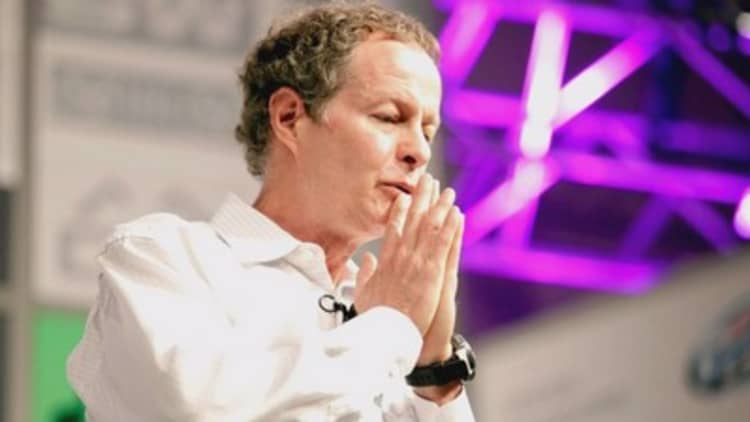
For Buffett's right-hand man, Berkshire vice chairman Charlie Munger, a grocery war also is a little personal. Munger is a longtime member of Costco's board of directors and has referred to Costco shares — downgraded by Wall Street firms since the Amazon deal announcement — over the years using any number of superlatives. He said in 2014 that even at a relatively high multiple, "I'd certainly rather buy Costco at 25X earnings than 90 percent of the other stocks." And here's an example that really ratchets up the hyperbole:
"I believe Costco does more for civilization than the Rockefeller Foundation," Munger said at an event in 2011.
Buffett has grocery stores 'in his blood'
The pricing pressure on supermarket giants such as Target, downgraded this week by Citi, and on food companies and their stocks, isn't certain. The Amazon deal for Whole Foods is not complete — there could still be counter bids by other grocery companies — and Amazon's strategy for Whole Foods remains an unknown. Kroger has also been among the supermarket chains rumored to be in a position where making an offer would make sense.
There are also concerns that a push by Amazon into better foods will force the "bad food" brands that Buffett loves into narrower shelf space within stores. But Wal-Mart will not simply cede any ground just because Bezos wants it — it's still the biggest force in the grocery sector, with nearly 15 percent share, double any other company's scale, and could make its own bid for Whole Foods. Whole Foods and Amazon together have about 1.4 percent of the grocery market.
One thing that benefits Berkshire is its size: No matter how much it holds in any single stock or sector, the $400 billion conglomerate is not going to see a major price move based on action related to one of its holdings. If Berkshire trades like any sector, it's financial stocks, because of its banks and wholly owned insurance companies, like Geico.
"BRK as a conglomerate is well positioned to withstand, overall, the tech onslaughts. So yes, it is good to be a conglomerate as a defensive matter," Cunningham said.
But there's one reaction from Buffett that Bezos' big deal could lead to: more buying.
Buffett was part of a failed bid by Kraft Heinz for Unilever earlier this year with his recent private equity partner on deals, 3G Capital. Ever since, the markets have been chattering about more deals in Buffett's future. S&P said in a report this week that Mondelez, General Mills, Kellogg, Campbell Soup as well as Colgate-Palmolive and Kimberly-Clark could all be targets, maybe even PepsiCo.
"Warren will not do more or fewer deals because of the M&A environment or deals of others, but I do think with $100 billion sitting around, the world is watching," Cunningham said.
Expectations for food deals won't slow down with Amazon using its might to get into the mix and terrifying everybody.
But few have been in food retail for as long as Buffett and Munger. Both have deep — more than most people know — experience as grocers. Buffett (86) and Munger (93) worked for the Buffett family grocery store, in their youth, mostly for Warren's grandfather, Ernest.
"Grocery stores are in their blood!" Cunningham said.
See also:
Warren Buffett's investing strategy helped one man turn $1,000 into $2 million
The 6 words billionaire Warren Buffett uses the most, according to a data scientist
Tony Robbins and Warren Buffett say this is the best investment you'll make in your life
WATCH: This college dropout grew Whole Foods into the company Amazon is buying for $13.7 billion
